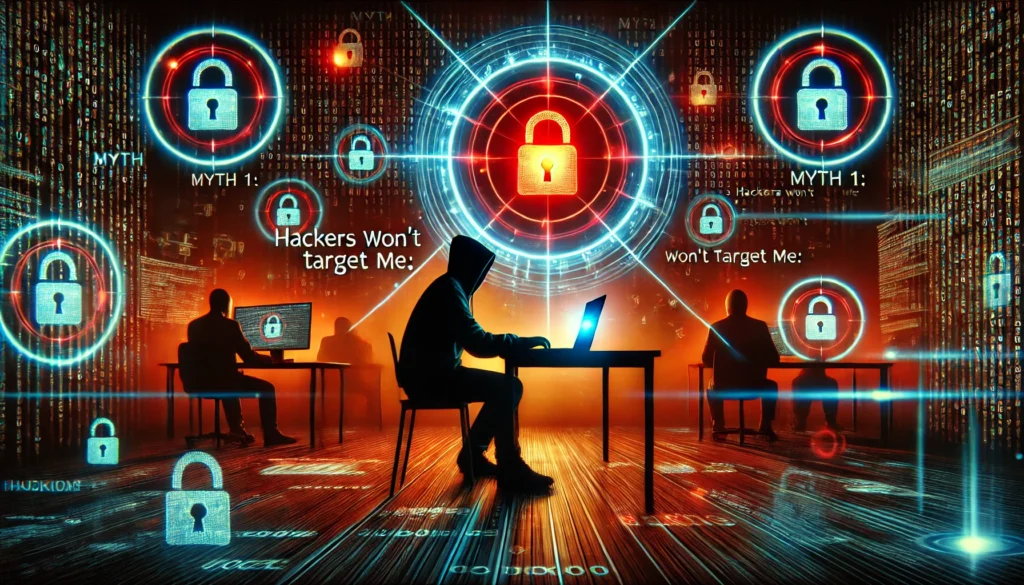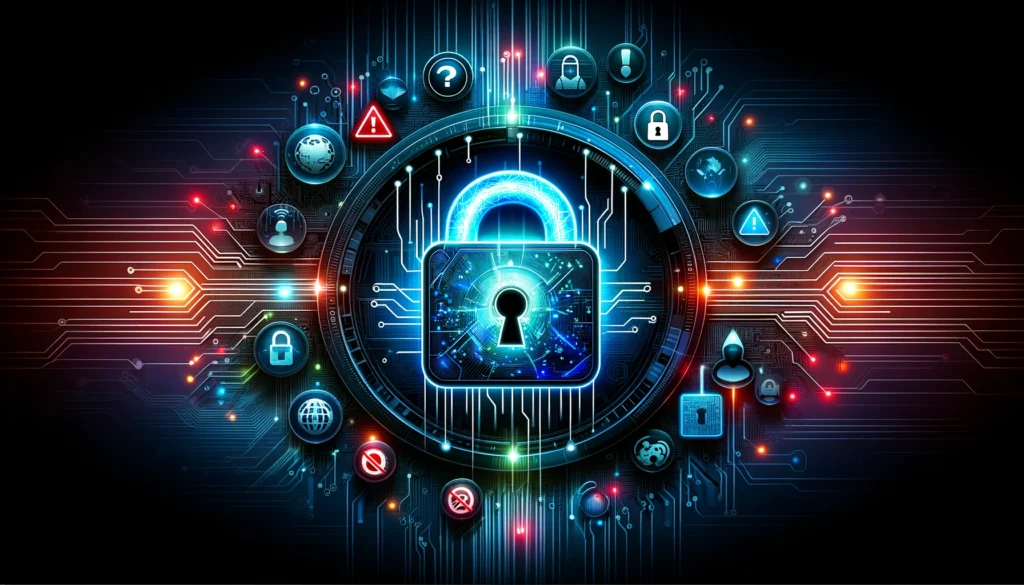In this article, we’ll handle a few of the top cybersecurity myths you should stop believing and give you with the actualities to offer assistance you remain secure online. In today’s computerized age, cybersecurity has ended up one of the most vital issues for people and businesses alike. With programmers always advancing their strategies, ensuring your individual information and advanced resources is more basic than ever. Be that as it may, in spite of far-reaching mindfulness approximately cyber dangers, numerous myths almost cybersecurity proceed to circulate. These misinterpretations can lead to destitute security hones and a wrong sense of security, taking off individuals powerless to attacks.
Myth 1: “Hackers Won’t Target Me”

One of the most perilous myths individuals accept is that they’re not at chance of a cyberattack. Numerous expect that programmers are as it were interested in huge enterprises or high-profile people. In any case, the reality is that cybercriminals target anybody with an online presence—whether you’re a trade proprietor, an understudy, or fair somebody who employments the web regularly.
Hackers frequently utilize robotized instruments to check the web for powerless gadgets and systems. In reality, agreeing to a report by the FBI, most cyberattacks are coordinated at little businesses, with numerous assaults pointed at individual gadgets like smartphones, tablets, and indeed domestic routers.
Why You’re a Target:
- Personal information: Your individual data is important. Programmers can take touchy information like passwords, credit card points of interest, and indeed your identity.
- Automated assaults: Programmers utilize bots to check for vulnerabilities, meaning anybody online is a potential target.
- Ransomware: Cybercriminals regularly target people and businesses alike with ransomware assaults, requesting installment to discharge your information or files.
Myth 2: “Antivirus Software Is All You Need”
Many individuals think that introducing antivirus computer program is sufficient to ensure them from all sorts of cyberattacks. Whereas antivirus programs are vital, they are as it were one layer of yours in general cybersecurity defense. They can offer assistance ensure you from known dangers, but they aren’t foolproof.
Antivirus program is successful at identifying malware and infections, but it can’t ensure against more progressed dangers, such as phishing assaults, social building, or zero-day abuses. Cybercriminals continually create modern strategies to bypass antivirus programs, so depending exclusively on antivirus program can take off you exposed.
Why It’s Not Enough:
- Phishing: Antivirus program can’t continuously distinguish phishing emails that trap you into uncovering your login qualifications or downloading malware.
- Zero-day vulnerabilities: Unused misuses may not be recognized by your antivirus program until they are distinguished and upgrades are released.
- Social building: A few programmers do not depend on malware at all. Instep, they utilize manipulative strategies to persuade you to hand over touchy information.
Myth 3: “Cybersecurity Is as it were for Tech Experts”

It’s simple to expect that cybersecurity is as it were for IT experts or tech specialists, but the truth is, everybody plays a part in online security. From watchword administration to dodging suspicious emails, fundamental cybersecurity propensities are basic for all users.
Many of the most harming cyberattacks, like phishing and watchword breaches, depend on human blunder. If you don’t hone fundamental security standards, you’re at hazard in any case of your tech knowledge.
Simple Steps Everybody Can Take:
- Strong passwords: Utilize a combination of letters, numbers, and uncommon characters, and dodge reusing passwords over different sites.
- Two-factor confirmation (2FA): Including an additional layer of security makes it harder for programmers to pick up get to your accounts, indeed if they have your password.
- Regular overhauls: Keeping your computer program, apps, and gadgets overhauled guarantees that you’re secured against known vulnerabilities.
Myth 4: “Open Wi-Fi Is Secure as Long as I Utilize HTTPS”
Using open Wi-Fi in places like coffee shops, airplane terminals, and inns is a common hone, but numerous individuals erroneously think that as long as a site employment HTTPS (the secure adaptation of HTTP), they are secure. Whereas HTTPS does give encryption between your browser and the site, it doesn’t cruel the Wi-Fi association is secure.
Public Wi-Fi systems are inalienably unsafe since they are regularly unsecured and can be effectively abused by programmers. Programmers can set up “fake” Wi-Fi systems, known as fiendish twins, which show up to be true blue open systems but are planned to captured your data.
Why Open Wi-Fi Is Risky:
- Man-in-the-middle assaults: Cybercriminals can have caught information between your gadget and the server, capturing delicate data like login accreditations or credit card numbers.
- Evil twin systems: Programmers make fake Wi-Fi systems with names that are indistinguishable or comparative to the genuine open systems, deceiving clients into connecting.
- Unencrypted information: Indeed, if a site employments HTTPS, other sorts of communication (like emails or app information) may not be scrambled, clearing out them open to interception.
Myth 5: “Secret word Complexity Is Enough”

Many individuals think that making a complex secret word is all they require to keep their accounts secure. Whereas a solid secret word is fundamental, it is not sufficient to ensure your information from today’s progressed cyber dangers. Secret word complexity alone does not address issues like secret word reuse or the potential for passwords to be stolen through phishing assaults or information breaches.
Using special, complex passwords for each account is the best hone, but it’s too critical to frequently upgrade them and screen for any signs of suspicious activity.
Password Pitfalls:
- Password reuse: Utilizing the same secret word for numerous accounts implies that if one secret word is compromised, all your accounts are at risk.
- Stolen passwords: Information breaches are common, and if your watchword is uncovered, programmers can pick up get to your account, in any case of its complexity.
- Human mistake: Indeed, complex passwords are defenseless if you compose them down or share them with others.
Myth 6: “Cybersecurity Is as it were Almost Technology”
Many individuals expect that cybersecurity is completely a specialized issue, including as it were firewalls, encryption, and computer program. In reality, cybersecurity is a mix of both innovation and human behavior. One of the most critical dangers to cybersecurity is human mistake, whether it’s clicking on a suspicious connect or falling flat to upgrade software.
Cybersecurity too includes a culture of mindfulness, preparing, and great propensities. It’s basic to have cybersecurity approaches input, conduct customary security preparing for workers (for businesses), and guarantee that everybody gets it the dangers and best practices.
Why Individuals Matter:
- Phishing: Representatives and people can be deceived into giving up delicate data through beguiling emails or websites.
- Security preparing: A solid cybersecurity culture inside a commerce can avoid most cyberattacks, particularly those depending on human mistakes.
- Social designing: Programmers regularly utilize mental strategies to control people into allowing get to or uncovering secret information.
Myth 7: “Security Patches Are Optional”
Some individuals accept that they can skip computer program or security overhauls since they think the upgrades are either pointless or badly arranged. In any case, skipping patches and upgrades is one of the most perilous things you can do to jeopardize your cybersecurity.
Most security patches are outlined to settle vulnerabilities that programmers can abuse. By not introducing overhauls, you take off your framework open to attack.
Why Upgrades Matter:
- Exploited vulnerabilities: Programmers effectively see for unpatched vulnerabilities in prevalent computer program and working frameworks to pick up unauthorized get to systems.
- Zero-day misuses: A few vulnerabilities are so unused that there is no fix however, but aggressors can still take advantage of them sometime recently a fix is released.
- Malware: Without standard upgrades, your gadget is more helpless to malware and ransomware assaults, which can have annihilating consequences.
Myth 8: “Cybersecurity Is Expensive”

Many individuals think that solid cybersecurity requires costly computer program, gear, and administrations. Whereas it’s genuine that certain high-end cybersecurity measures can be expensive, there are numerous reasonable and indeed free ways to ensure yourself online.
For illustration, you can introduce free antivirus program, utilize watchword supervisors to create and store solid passwords, and empower two-factor confirmation (2FA) on your accounts—all at no cost.
Cost-Effective Cybersecurity Tips:
- Use free security instruments: Numerous legitimate companies offer free antivirus and anti-malware apparatuses that give strong protection.
- Regular reinforcements: Reinforcement your information frequently to ensure against ransomware and other data-loss threats.
- Security best hones: Teach yourself and your family or workers on fundamental cybersecurity hones, such as dodging suspicious emails and making solid passwords.
Conclusion:
Cybersecurity myths can be unsafe since they lead to complacency and destitute security hones. By debunking these common misguided judgments, you can take the right steps to ensure yourself from cyber dangers. Whether you’re a person client or a trade proprietor, understanding the substances of cybersecurity is the to begin with step in building a solid defense against cybercrime. Remain educated, hone great propensities, and keep in mind that in today’s computerized world, no one is totally secure unless they take activity to secure their online nearness.
Read more posts:

